Following the tradition of the National Open Champion questionnaire,
the 6 2014 Open Champions kindly contributed some answers following their Championship win.
Australian 2014 National Champion:
Sarah Osvath – Womens Epee.
1: How long have you been Fencing? What made you start? How long did it take for you to feel competitive?
A: I have been fencing for over 40 years now, starting in my last year of primary school when fencing was offered as an elective sport by my teacher Susan Grant-Taylor, at the school I attended in Wainuiomata, New Zealand. I was captivated by this unique sport straight away and it took several years to feel competent.
2: How long have you been Competing at National / International level?
A: A long time and continuing… Nationally in NZ as a school fencer,(foil as females fenced only foil in those days), Under 20’s (National champion 6X).Interestingly my first International competition was travelling to Australia to fence in the Australian U20 Championship. Internationally, representing Australia at the Commonwealth Fencing Championships in 1994,1998,2002,2010. Many Women’s Epee World cup events between 1995 and 2002. World Championships 1995,97,98,99 and the first ever Women’s Epee event at the Atlanta Olympic Games in 1996. I have fenced in all but one Australian National Championships since 1988-2014 and a good 80% of the Australian open circuit events over this period.
3: What made you choose your weapon? have you fenced the other 2?
A: I actively made the decision to fence/train/receive individual lessons in epee in 1993 after nearly 20 years of foil. My height and speed whilst a disadvantage in foil could be an asset in epee. . I had moved for personal reasons to Melbourne from Canberra and had the accessibility of training with Vlad Sher,the National epee coach. Women’s epee was relatively new on the International scene and without the complication of referees and with a fairly even standard worldwide success was possible. The epee gamble was worth pursuing and certainly the correct decision for me.
4: Where is your favourite place to fence or to train?
A: Anywhere as long as there are other passionate, committed fencers who want to train determinedly and aspire to continually improve and become the best they can be. Any competition big or small is a strong drawcard.
5: How important have a coach and training partners been to you?
A: A coach is of the utmost importance – one that you respect and who respects your endeavours. There should be a big investment by both of you, a few risks and hopefully many rewards. Personally, I have only had two epee coaches, Vlad Sher from 1993-1997 whilst I resided in Melbourne. Since living in Sydney from 1997, my coach is Simon Jin. (That is a lot of individual lessons).
Training partners are extremely important and valuable to me.
6: What are your future ambitions for 2015 and beyond? work / training / competition?
A: As well as achieving gold at the 2014 Australian Open Championships, I secured 2nd place at the 2014 World Veteran Championships in Hungary. My ambition is to become Women’s Epee Veteran World Champion within the next few years. (i.e., to join Vici Wilks as World Champion)
7: Who if anyone have you modeled your fencing on? Or do you have a favourite Fencer (Internationally)?
A: I’ve been around a long time and have constantly developed my fencing. I haven’t modeled myself on any one particular person but I do have many International fencers I openly admire. This includes Imke Duplitzer, Laura Flessel-Colovic, Kaido Kaberma and Pavel Kolobkov but the list is actually quite long.
8: What if any other cross training activities do you play/train?
A: I also play competitive field hockey, twice a week during the hockey season (April-September). I enjoy a 90mins bike ride each Sunday.
9: What difference if any did this national event have to others?
A: Winning the Australian National Championship again was a big thrill. Having previously won in 1995,1997,1999 and most recently in 2003 I thought that this top title was a little elusive for me having lost several finals to take silver but in any case usually a podium finish.(Spanning 20 years).
10: What is your weekly training Regime?
A: I train at three different University Fencing clubs here in Sydney, Monday, Wednesday, Thursday, Friday evenings incorporating a lot of bouting plus individual lessons. Saturday afternoon I attend a 2hr Fencing Speed & Agility specific class followed by a session of bouting.
11: What advice would you give future Australian champions?
A: Work out your plan, train hard with as many fencers as possible. Strive towards realistic goals. Recognise that there are peaks and troughs with your results and that basically you get a return proportional to your effort and work load. It should have a definite fun component.
12: What is the best / worst thing about Fencing in Australia?
A: The worst thing about fencing in Australia is the demise of selection on merit for National team representation.
The best thing about fencing in Australia is the talented, experienced coaches and fencers that provide the opportunity to develop a firm basis for achieving on the World stage. Also our proximity to fencing in Asia.
Thanks very much Sarah!
